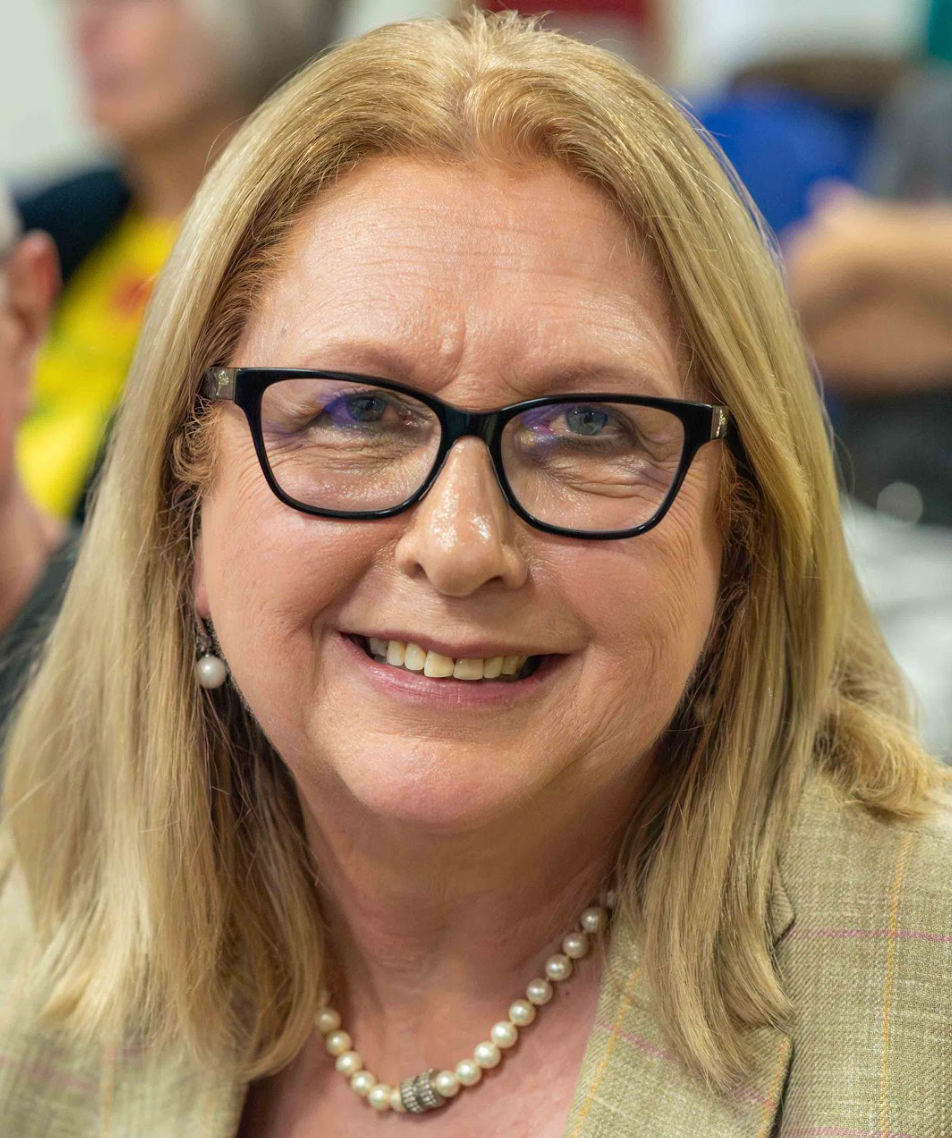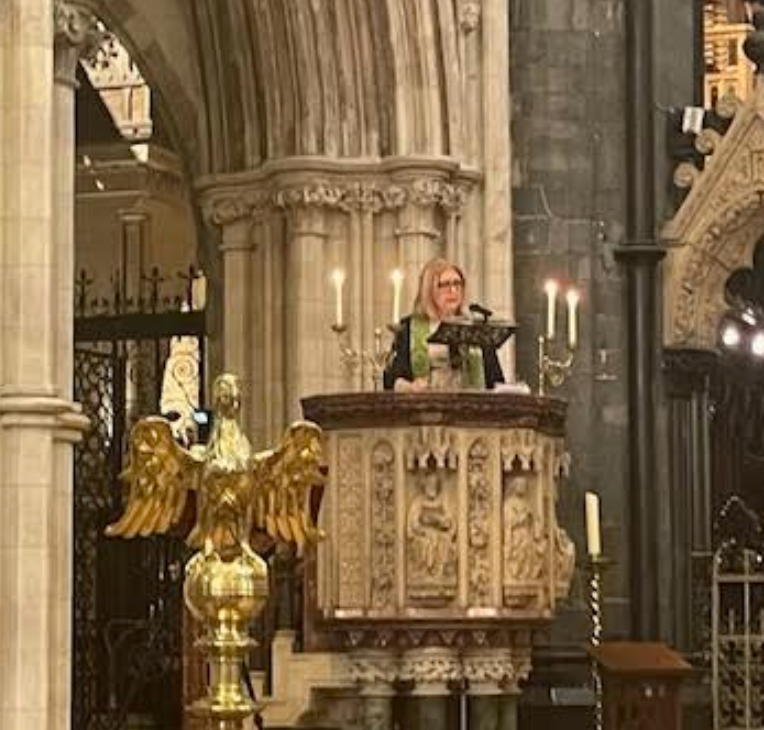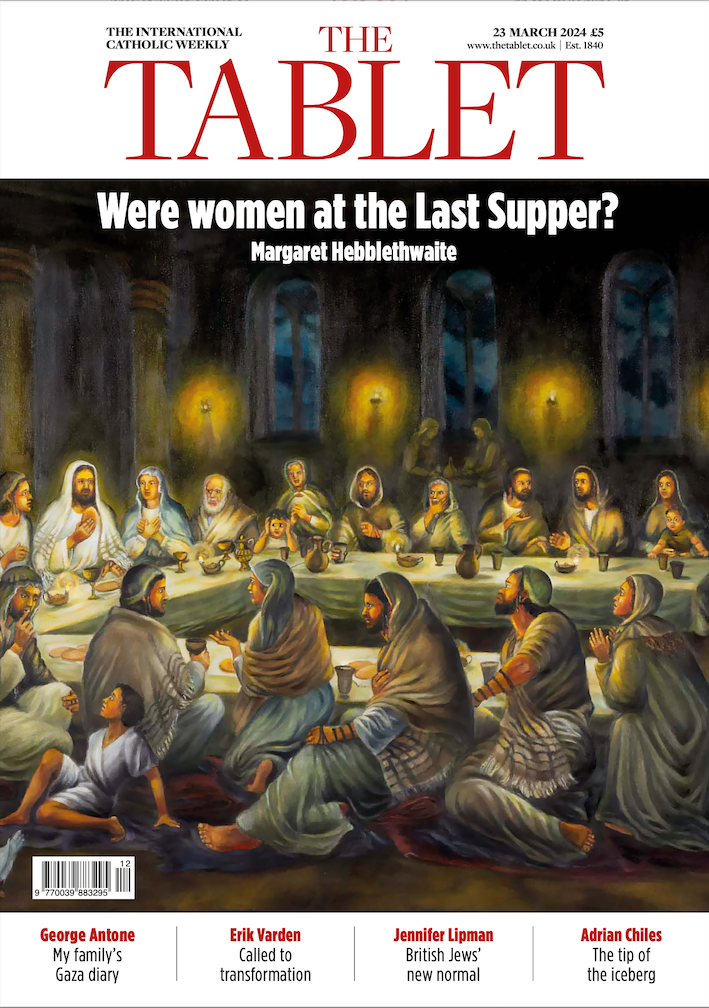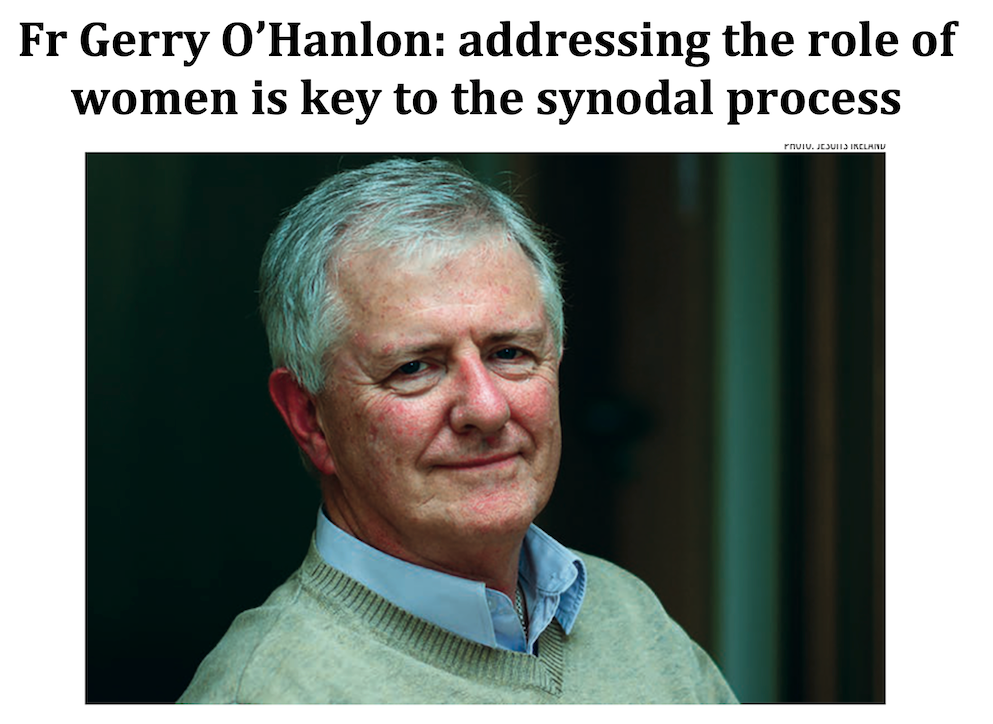The Synodal Path
Some Comments: Gerry Mangan
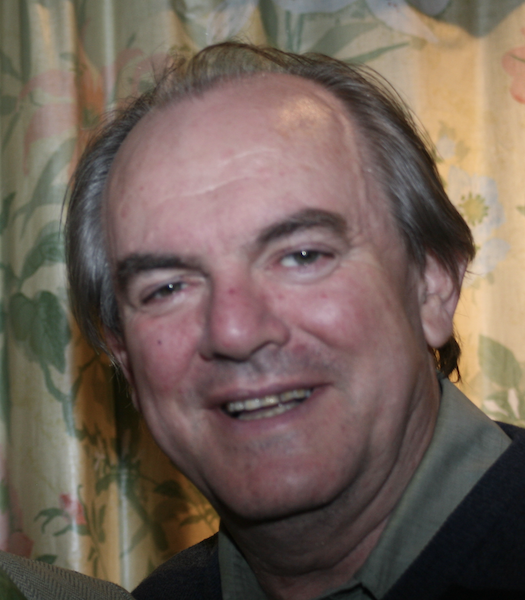
I grew up in a predominantly rural area and spent my formative years in the pre Vatican Church. Ireland from the post famine mid 19th century, .“ experienced a religious revival that has had few parallels” and that involved an almost universal attendance at religious services and a high degree of acceptance of the moral authority of the Catholic Church . Vocations to the priesthood and the religious life were high and this phenomenon continued up to the 1970s/80s. The Canadian theologian Charles Taylor described this socio cultural context as ”an enchanted world , whose faith and the spiritual suffused daily life, making it nigh impossible not to believe” . The socio economic context is also important. Ireland was economically under developed, and little state support was available for health services and education and social welfare. The Catholic Church provided much support in this regard through its clergy, religious orders and lay organisations such as the Vincent de Paul, Legion of Mary etc.
Modern communications were not as pervasive as they are today, except for radio, and readership of newspapers was quite limited. Gathering for weekly Mass was a significant source of views on values and life. Many ordinary people, therefore, were relatively insulated from secular influences. Emigration was high but, based on the emigration from my own family and local community, a high proportion of emigrants retained their traditional Catholic faith.
The Catholic faith then provided the following:
· Religious practice then helped people cope with the insecurities of life in relation to the risks of poverty, illness and disability, alcohol abuse and addiction, providing for large families (pre advent of reliable contraception) etc. through the sacraments and popular piety, rosary, novenas, pilgrimages etc
· Achieving salvation in the next life was also central. People prayed for a happy death and for the souls in purgatory.
· The parish was also the main focus of the community not only in relation to religious services but also cultural and sporting pursuits. The local priests also provided much leadership and gained much respect in this regard from the Community. These were supplemented by the provision of the many services mentioned above.
The Virtue of Chastity
The virtue back then that got most attention was the virtue of chastity. Chastity is a concept found in the three Abrahamic religions—Judaism, Christianity, and Islam. It refers to purity of one's thoughts and deeds, particularly as they apply to sexual relations. To be chaste means that one is a virgin until marriage and engages in sex only with one's lawful spouse. In that context, sex outside marriage was strongly condemned. Women were seen as having the main responsibility for upholding morality in that sphere. These beliefs and values influenced at least in part the attitudes and practices in the Mother and Baby homes, the Magdalen Laundries, and to the many women who ended up in these homes having been rejected by their families. It may also help to explain why clerical and religious child sex abuse has attracted such a level of criticism that is out of proportion to overall number of such cases, most of which occur in families and in other institutions where adults interact with children eg education, sporting organisations etc. This may be due at least in part to the contrast between what the Church preached in this regard and the behaviour of some of its clergy/religious and the cover ups to protect the Church’s reputation.
Contribution to Society
Having been reared in the pre-Vatican Church, which is also that of my parents, grand parents and previous generations, I do resent the criticisms of it today that can be so decontextualised. They and don’t recognise the contribution it made by these generations as Catholics to Irish society over the centuries when Ireland was a colony of the UK under Protestant governance and Irish people suffered so much poverty, discrimination and racism. This is also the case with the Irish diaspora, who emigrated to the UK, USA, Canada, Australia and New Zealand, all Protestant States. . Michelle Dillen points out, for example, that “in the United States, the Catholic Church’s origins as an outsider, immigrant church in a historically Protestant society propelled it to develop a robust infrastructure of schools, colleges, hospitals, charities, social services and media organisations. These complemented , reinforced and extended its faith-based worship structures, primarily defined by the parish.’ A similar pattern applied in Ireland, especially in the North, and in the other countries I mentioned above.
Bias in critiques of the past
Andrew Marr observes in his recent book on ‘The Elizabethans’ that ‘there is nothing so irritating as looking back at previous generations in a spirit of moralizing self-righteousness – what the historian (of the Working Class) E.P. Thompson called ‘ the enormous condescension of posterity. Pope Francis in a recent publication ‘Let us Dream’[i] states that ‘ a free people is a people that remembers, is able to own its history rather than deny it, and learns its best lessons’. In looking back, we should also bear in mind the observation of GK Chesterton that Jesus did not found a Church for good (people). He founded a Church for all (people). So we should not be surprised to find many in it who are anything but good. I also think that he observation of LP Hartley that ‘ The past is a foreign country, they do things differently there?’is very apt. The key word for me is ‘differently’, neither better nor worse than currently, but from which we can still learn its best lessons.
Decline of the Church?
The current narrative is that the Church is in decline. That appears to be the case in the Western world including Ireland. This is often attributed to its teaching on sexual morality and the disillusionment and challenges to faith of the various scandals. However, this decline is mainly due to secularisation, as in the rest of the Western world. Secularisation is a process by which culture progressively defines itself in a “this worldly’ context, one that in its most radical form ie secularism, excludes any reference to a religious, sacred or transcendent horizon of meaning”.. As mentioned above , the religious revival from the mid 19th century and Ireland’s relative isolation, both socially and economically, delayed secularisation taking hold. But this has been changing with the advent of modern communications, expansion of education including third level, foreign travel, membership of the EU and, as a consequence, the development of an open economy. One current result of this in the Western, predominantly secular world, is, as the late Michael Paul Gallagher SJ observed that “apathy has come to be the dominant type of unbelief ..there is now a whole new generation of baptised young adults whose formative experiences with religion or Church are so thin as to be almost non-existent”. Theologian, Gabriel Daly OSA, commented in a paper delivered to ‘We are Church’ that “sometimes today we may find that people we know ask us ‘ why do you hang on to all that religion stuff’? If we attempt to give an intelligent answer, they may simply change the subject. It wasn’t a question of any depth or sincerity for them. They were asking you why are you not like them, free from what they see as the shackles of religion. Their unbelief is probably as superficial as their belief was.” Mostly these views are formed by the powerful media and social media.
Vatican II
However, they don’t always acknowledge or explain that many of these, sometimes valid criticisms, were addressed by the Vatican II Council. This applies most obviously to the liturgy, especially the use of the vernacular (our own languages) instead of Latin, Revelation, encouraging reading, studying, and praying the Bible, an openness to the modern world and reading the” signs of the times” through its documents such as on the Church in the Modern World, and on Religious Freedom, to name but a few. Many of these decrees, especially on the Liturgy, Revelation, Ecumenism religious freedom have much in common with the faith of many Protestant Churches. A major source of difference, for example, from the Reformation had been the doctrine of Justification by faith alone, which was so important for Martin Luther. Gabriel Daly also pointed out in his paper that there is agreement between Lutherans and Roman Catholics on this doctrine.
Ecumenism
One aim of Vatican II, of special relevance to Ireland, is ecumenism, designed to bring the various Christian Churches together. To date this goal has not been realised in terms of producing “full, structural, visible unity” among the divided Churches. However, it has overcome much of the prejudice and suspicion that once dogged them, making it easier for different types of Christians to marry one another and to join forces on all types of concerns’, not least on theological and biblical studies3. This is largely the case in Ireland. However, the main opposition to it now comes from some Protestant Churches, especially in Northern Ireland.
Pope Francis
Pope Francis, throughout his pontificate to date has been fully committed to Vatican II, and “bringing things up to date “ in the Church. He points out, for example, “ that it is no longer possible to claim that religion should be restricted to the private sphere and that it exists only to prepare souls for heaven”, as had largely been the case in Ireland up to recently. A key dimension of Catholicism in recent decades has been the continuing development of the Church’s social teaching by successive Popes. Pope Francis has given high priority to this fundamental aspect of the Christian calling in saying that he wants a Church which above all “is poor and for the poor....We are called to find Christ in them, to lend our voice to their causes , but also to be their friends, to listen to them, to speak for them and to embrace the mysterious wisdom which God wishes to share with us through them Giving witness also involves working for social justice and discerning and taking opportunities to promote it in whatever roles we have in society. This reality is recognised by Pope Francis in his assertion that in a post secular world “ we have been called to form consciences, not to replace them” In this vein, he asks Catholics to practice “an authentic faith” which is never comfortable or completely personal – always involves a deep desire to change the world, to transmit values, to leave this earth somehow better than we found it”
Pope Francis is also the first Pope to give the Church’s unequivocal support in his Encyclical Laudato Si [1] on care of our common home, to the central importance of combating climate change, which he refers to as ‘global environmental degradation’. He speaks ‘of the earth herself, burdened and laid waste’ (as)’ among the most abandoned and maltreated of our poor’[2] . The Encyclical is addressed to ‘every person living on the planet’[3]
Catholicism worldwide
Worldwide the Catholic Church is still a major force. John Allen has pointed out that in the course of the 20th century the number of Catholics grew from 266 million in 1900 to 1.2 billion today making Catholicism arguably the world’s largest religious body, one of its truly global institutions and its best organised ‘However, especially in Europe and North America, as mentioned above it is reeling currently from the series of horrifying sexual abuse scandals that have ‘badly damaged its public image and its moral authority (not to mention its finances). It is haemorrhaging members in this part of the world, not least in Ireland. For example, there are now 22 million ex Catholics in the USA and there are similar trends in traditional Western Catholic countries. But there is also growth in countries such as India and Africa. In Africa during the last century the number of Catholics rose from 1.9 million to 139 million. Even in the US there are roughly 6 million adult converts. However, as in the past, not least in Ireland, the expansion of Catholicism, has led to persecution. . A recent report in January 2020 estimated that up to 220 million Catholics are being persecuted for their faith world wide. Much of this is concentrated in south and east Asia, but also in parts of Africa, especially in Egypt and Nigeria. It is in a way particularly tragic in the Middle East that Christian communities that can trace their origins back to the foundation of Christianity are living in a hostile environment and being greatly depleted. In asking for prayers the priority of those vulnerable to persecution is not so much that they will be spared persecution, but that they will keep the faith despite persecution. The plight of these and other Christian minorities get little publicity in the media, compared to the plight of the Palestinians, whose cause is, of course, also worthy of support.
The Synodal Path
Inevitably in a worldwide consultation, the views provided have to be concise and based on a framework that in effect facilitates tabulation at each level. The following are my views in light of the above.
Evolution of Church today
The writer William Faulkner in Requiem for a Nun stated that “the past is never dead, it is not even past.” In just 10 years time in 2032 we will be commemorating the 16 th centenary of the coming of Christianity to Ireland. During the next 10 years I consider there should be focus on studying and evaluating the contribution the Church(s) has made over the centuries both in Ireland, among our diaspora and through our missionaries in many parts of the world, with a view to developing a more balanced narrative than is the case today, especially for the younger generations. They are the future of the Church. We rely on them to maintain and advance the Church’s mission in a post secular world, but in my opinion their faith and commitment are being eroded by the unbalanced criticism from the media and from other quarters. This applies especially to the trenchant criticism from the more liberal side in the Church. One outcome of this already is that young liberal minded people are becoming alienated from the Church and already clergy and religious are being drawn from young people of a more conservative disposition.
Challenges facing society
There is much focus on the impact of the Church on Irish society especially since the independence of the 26 counties. This should be balanced by assessing the impact which the rapid decline of the Church is having now and into the future, especially into the future.
Families
In post secular Europe there is a major decline in the birth rate and, as a consequence, in the proportion of Europeans in the world. Marriage equality on constitutional and legal grounds has been achieved for same sex couples, but has significantly worsened on socio economic grounds, with growing numbers cohabiting, having children outside marriage, marrying and having children much later in life, having to have recourse to IVF or being childless. Increasing numbers of women are opting not to have children. This can be for career reasons, not having a reliable steady partner, and the impact on their lifestyle that childcare responsibilities bring.
Freedom of choice
This also gives rise to the issue of freedom of choice. The pro choice position in the abortion referendum was concerned with women having control of their own bodies and being able to choose abortion in the case of an unplanned pregnancy. But the other side of that choice is being able to go ahead with the pregnancy and have a baby, if that is the preferred choice.. There are many obstacles to opting for that choice in relation to the adequacy of that support, especially in relation to housing and affordable child care, impact on career, strength and stability of relationship with partner. There is also the impact of societal attitudes. Given the availability of contraception and abortion, why have a pregnancy or go ahead with it if it is going to inconvenience one’s employer. The recent case of the TD who decided to resign from the Sinn Fein party because of these attitudes is an example of this.
Ageing of the population
A major on going result of this for society generally is a rapidly aging population and the burden that will be placed on the working age cohorts in the future of having to provide them with pensions, health and care services. Pope Francis has given major priority to these issues during his pontificate, especially through Amoris Laetitia . Meeting the challenges of full freedom of choice in relation for couples in having their preferred number children and in achieving marriage equality on socio economic grounds are essentially a matter for lay members of the Church. I don’t see much evidence that these are in fact priorities in the current debated around these issues especially in the media.
Climate Change
Western secular society is mainly responsible for climate change which is already having a devastating impact on many of the poorer regions in the world. Pope Francis is giving a significant lead to the Church and the world on this issue, especially through Laudato si. I don’t see many Catholics, at least in Ireland, drawing much guidance and inspiration from this in their policy positions and actions.
Church Structures
I believe the overall aim should be to develop a more lay centred Church that will have a significant, effective presence in a post secular society. A key part of this should be to open the priesthood to women and to married women and men. The choice of a consecrated celibate life for both priests and religious should still be available. However, I was struck by a comment made to me our local Church of Ireland Minister on this issue some time ago. He said that his Church already had married male clergy and both women priests and bishops, many of whom were also married. However, there was no major increases in their congregations as a result and relatively few converts from the Catholic Church. There may be a need, therefore, for further developments beyond this. This could include a more flexible ministry, involving full time for periods and part time for other periods of the life cycle. Ministers should be largely economically independent with their own careers, following the example of St. Paul, the tent maker.. For example, they could undertake Youth Ministry in their 20s before marriage/family, then decide whether to marry and take up a part time Ministry for a period when their family is young. They could go more full time when their family is reared, and when they are in retirement from work. There is currently not just a shortage of priests, but a grave shortage in the younger age cohorts who could more directly and credibly relate to those in the 20s and 30s age cohorts who in my experience are critical for the future of the Church.
Conclusion
There are many more points I could make, but this is already far too long. But I hope it may be of some assistance to WAC members in considering where we want the Church to go and our priorities in this regard on the Synodal path.
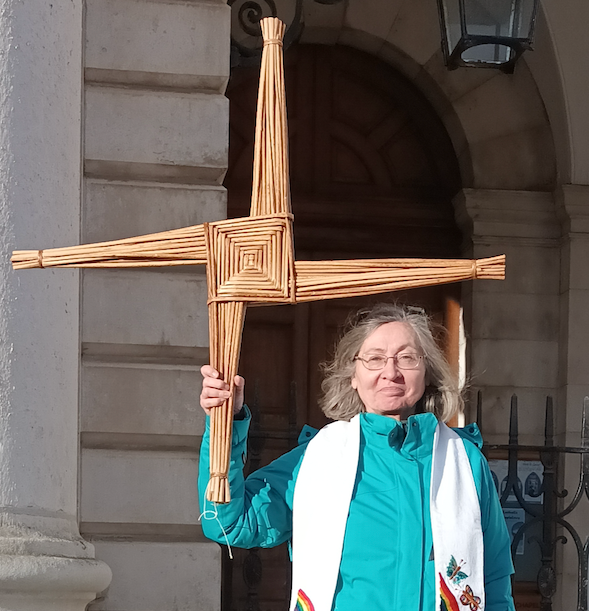

Women are a problem for the Catholic Church, an institution with ingrained misogyny - Soline Humbert
About us
We are working to develop inclusive communities based on our 6 Aims, while being open to engage with all sections of the church about our lives in the church today.
Contact Info








